Jinwoo Shin
Korea Advanced Institute of Science and Technology
Guiding Deep Molecular Optimization with Genetic Exploration
Jul 17, 2020


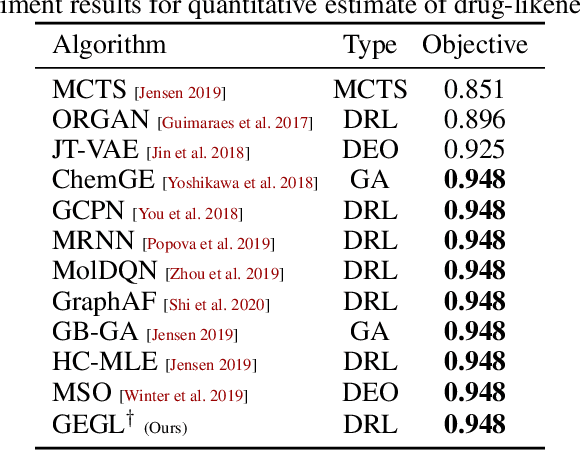
Abstract:De novo molecular design attempts to search over the chemical space for molecules with the desired property. Recently, deep learning has gained considerable attention as a promising approach to solve the problem. In this paper, we propose genetic expert-guided learning (GEGL), a simple yet novel framework for training a deep neural network (DNN) to generate highly-rewarding molecules. Our main idea is to design a "genetic expert improvement" procedure, which generates high-quality targets for imitation learning of the DNN. Extensive experiments show that GEGL significantly improves over state-of-the-art methods. For example, GEGL manages to solve the penalized octanol-water partition coefficient optimization with a score of 31.82, while the best-known score in the literature is 26.1. Besides, for the GuacaMol benchmark with 20 tasks, our method achieves the highest score for 19 tasks, in comparison with state-of-the-art methods, and newly obtains the perfect score for three tasks.
Distribution Aligning Refinery of Pseudo-label for Imbalanced Semi-supervised Learning
Jul 17, 2020
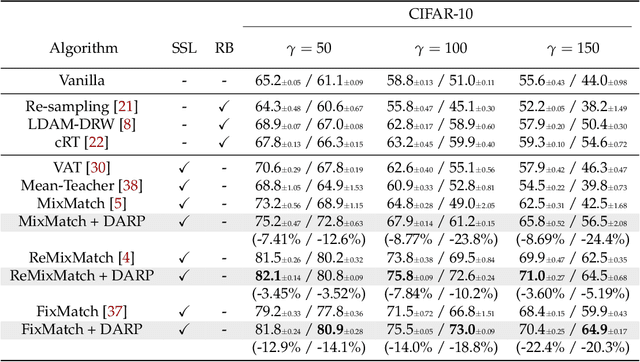
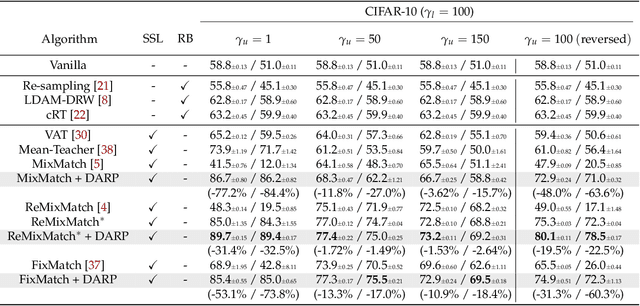

Abstract:While semi-supervised learning (SSL) has proven to be a promising way for leveraging unlabeled data when labeled data is scarce, the existing SSL algorithms typically assume that training class distributions are balanced. However, these SSL algorithms trained under imbalanced class distributions can severely suffer when generalizing to a balanced testing criterion, since they utilize biased pseudo-labels of unlabeled data toward majority classes. To alleviate this issue, we formulate a convex optimization problem to softly refine the pseudo-labels generated from the biased model, and develop a simple algorithm, named Distribution Aligning Refinery of Pseudo-label (DARP) that solves it provably and efficiently. Under various class-imbalanced semi-supervised scenarios, we demonstrate the effectiveness of DARP and its compatibility with state-of-the-art SSL schemes.
CSI: Novelty Detection via Contrastive Learning on Distributionally Shifted Instances
Jul 16, 2020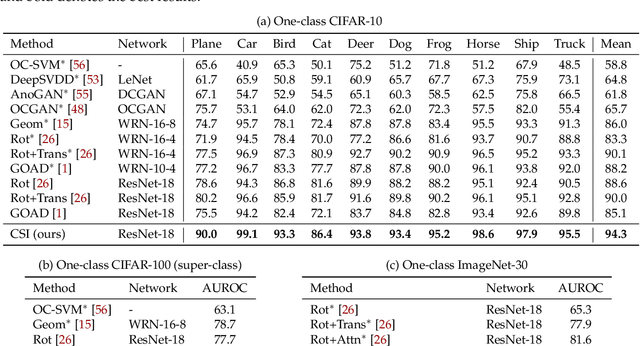

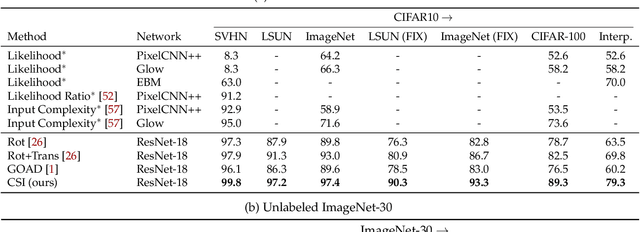

Abstract:Novelty detection, i.e., identifying whether a given sample is drawn from outside the training distribution, is essential for reliable machine learning. To this end, there have been many attempts at learning a representation well-suited for novelty detection and designing a score based on such representation. In this paper, we propose a simple, yet effective method named contrasting shifted instances (CSI), inspired by the recent success on contrastive learning of visual representations. Specifically, in addition to contrasting a given sample with other instances as in conventional contrastive learning methods, our training scheme contrasts the sample with distributionally-shifted augmentations of itself. Based on this, we propose a new detection score that is specific to the proposed training scheme. Our experiments demonstrate the superiority of our method under various novelty detection scenarios, including unlabeled one-class, unlabeled multi-class and labeled multi-class settings, with various image benchmark datasets.
Learning to Sample with Local and Global Contexts in Experience Replay Buffer
Jul 14, 2020
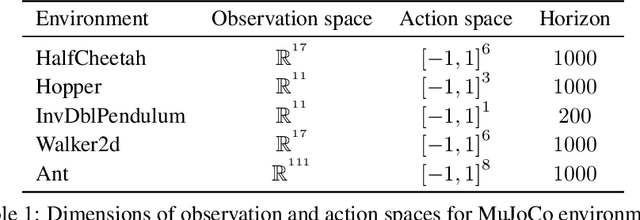
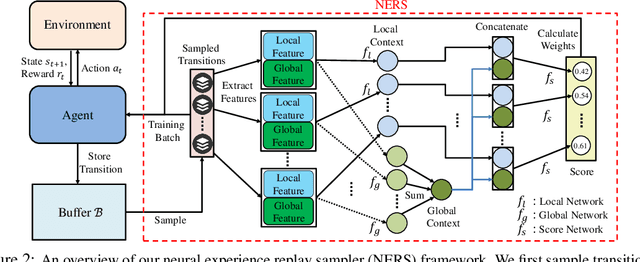

Abstract:Experience replay, which enables the agents to remember and reuse experience from the past, plays a significant role in the success of off-policy reinforcement learning (RL). To utilize the experience replay efficiently, experience transitions should be sampled with consideration of their significance, such that the known prioritized experience replay (PER) further allows to sample more important experience. Yet, the conventional PER may result in generating highly biased samples due to considering a single metric such as TD-error and computing the sampling rate independently for each experience. To tackle this issue, we propose a Neural Experience Replay Sampler (NERS), which adaptively evaluates the relative importance of a sampled transition by obtaining context from not only its (local) values that characterize itself such as TD-error or the raw features but also other (global) transitions. We validate our framework on multiple benchmark tasks for both continuous and discrete controls and show that the proposed framework significantly improves the performance of various off-policy RL methods. Further analysis confirms that the improvements indeed come from the use of diverse features and the consideration of the relative importance of experiences.
Learning from Failure: Training Debiased Classifier from Biased Classifier
Jul 06, 2020


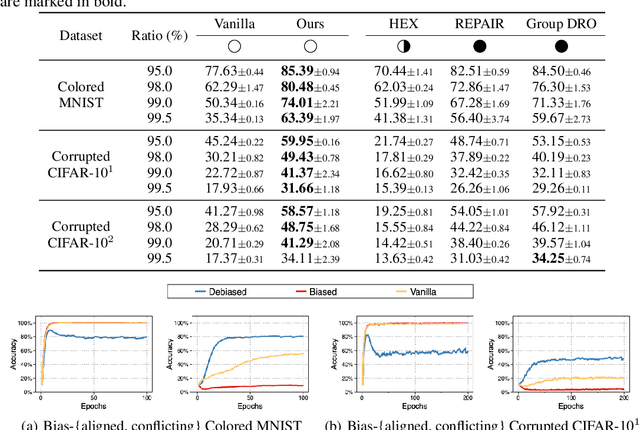
Abstract:Neural networks often learn to make predictions that overly rely on spurious correlation existing in the dataset, which causes the model to be biased. While previous work tackles this issue with domain-specific knowledge or explicit supervision on the spuriously correlated attributes, we instead tackle a more challenging setting where such information is unavailable. To this end, we first observe that neural networks learn to rely on the spurious correlation only when it is ''easier'' to learn than the desired knowledge, and such reliance is most prominent during the early phase of training. Based on the observations, we propose a failure-based debiasing scheme by training a pair of neural networks simultaneously. Our main idea is twofold; (a) we intentionally train the first network to be biased by repeatedly amplifying its ''prejudice'', and (b) we debias the training of the second network by focusing on samples that go against the prejudice of the biased network in (a). Extensive experiments demonstrate that our method significantly improves the training of network against various types of biases in both synthetic and real-world datasets. Surprisingly, our framework even occasionally outperforms the debiasing methods requiring explicit supervision of the spuriously correlated attributes.
Learning What to Defer for Maximum Independent Sets
Jun 29, 2020
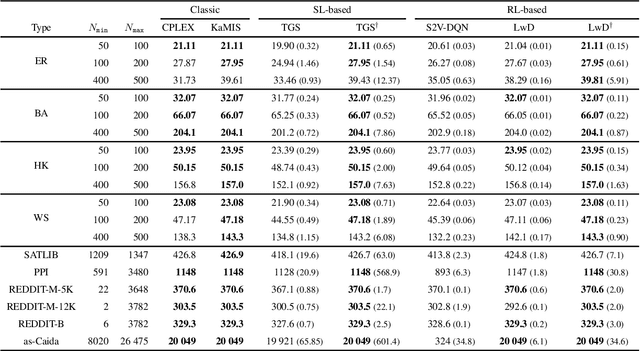
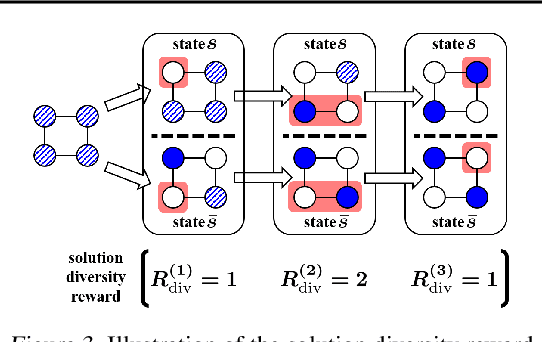

Abstract:Designing efficient algorithms for combinatorial optimization appears ubiquitously in various scientific fields. Recently, deep reinforcement learning (DRL) frameworks have gained considerable attention as a new approach: they can automate the design of a solver while relying less on sophisticated domain knowledge of the target problem. However, the existing DRL solvers determine the solution using a number of stages proportional to the number of elements in the solution, which severely limits their applicability to large-scale graphs. In this paper, we seek to resolve this issue by proposing a novel DRL scheme, coined learning what to defer (LwD), where the agent adaptively shrinks or stretch the number of stages by learning to distribute the element-wise decisions of the solution at each stage. We apply the proposed framework to the maximum independent set (MIS) problem, and demonstrate its significant improvement over the current state-of-the-art DRL scheme. We also show that LwD can outperform the conventional MIS solvers on large-scale graphs having millions of vertices, under a limited time budget.
Learning to Generate Noise for Robustness against Multiple Perturbations
Jun 22, 2020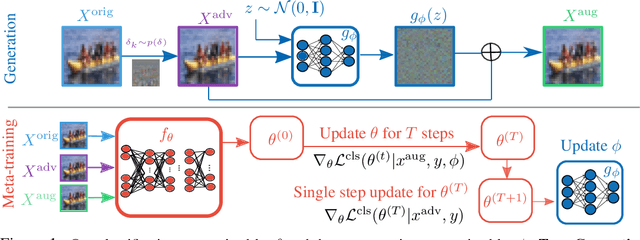
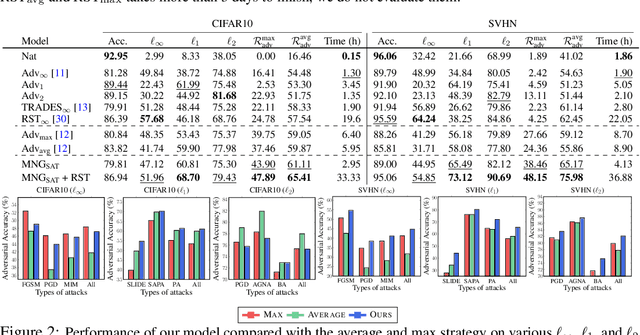
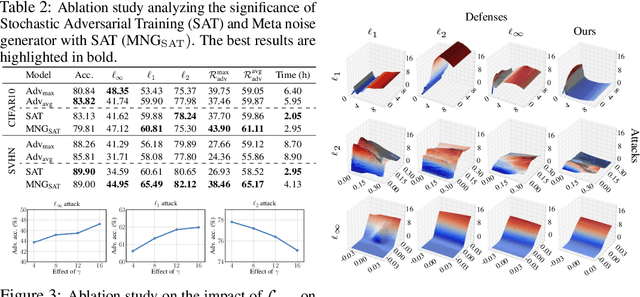
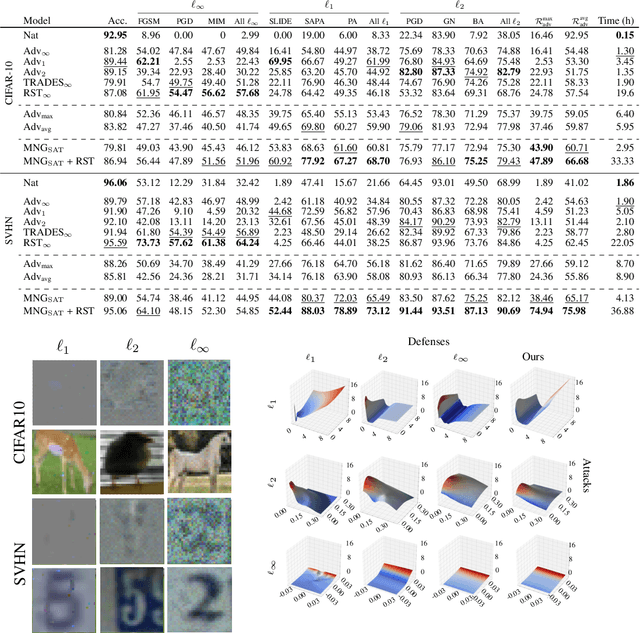
Abstract:Adversarial learning has emerged as one of the successful techniques to circumvent the susceptibility of existing methods against adversarial perturbations. However, the majority of existing defense methods are tailored to defend against a single category of adversarial perturbation (e.g. $\ell_\infty$-attack). In safety-critical applications, this makes these methods extraneous as the attacker can adopt diverse adversaries to deceive the system. To tackle this challenge of robustness against multiple perturbations, we propose a novel meta-learning framework that explicitly learns to generate noise to improve the model's robustness against multiple types of attacks. Specifically, we propose Meta Noise Generator (MNG) that outputs optimal noise to stochastically perturb a given sample, such that it helps lower the error on diverse adversarial perturbations. However, training on multiple perturbations simultaneously significantly increases the computational overhead during training. To address this issue, we train our MNG while randomly sampling an attack at each epoch, which incurs negligible overhead over standard adversarial training. We validate the robustness of our framework on various datasets and against a wide variety of unseen perturbations, demonstrating that it significantly outperforms the relevant baselines across multiple perturbations with marginal computational cost compared to the multiple perturbations training.
QOPT: Optimistic Value Function Decentralization for Cooperative Multi-Agent Reinforcement Learning
Jun 22, 2020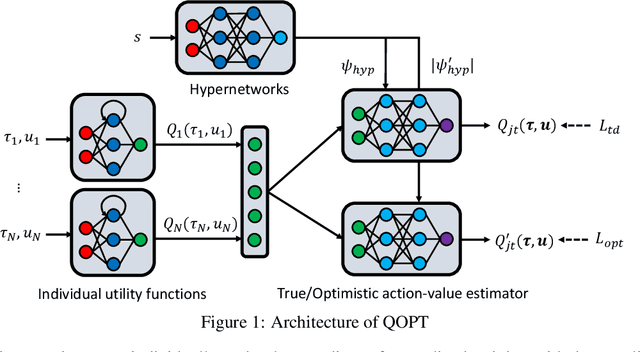

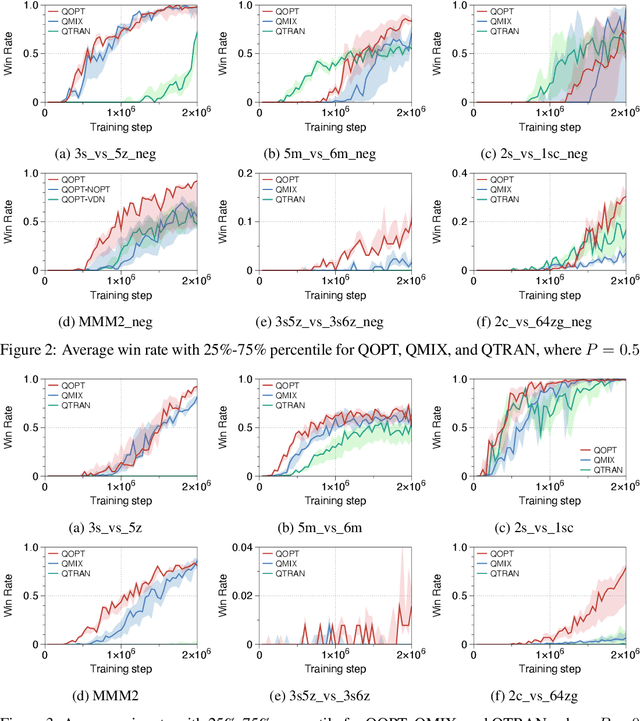

Abstract:We propose a novel value-based algorithm for cooperative multi-agent reinforcement learning, under the paradigm of centralized training with decentralized execution. The proposed algorithm, coined QOPT, is based on the "optimistic" training scheme using two action-value estimators with separate roles: (i) true action-value estimation and (ii) decentralization of optimal action. By construction, our framework allows the latter action-value estimator to achieve (ii) while representing a richer class of joint action-value estimators than that of the state-of-the-art algorithm, i.e., QMIX. Our experiments demonstrate that QOPT newly achieves state-of-the-art performance in the StarCraft Multi-Agent Challenge environment. In particular, ours significantly outperform the baselines for the case where non-cooperative behaviors are penalized more aggressively.
Minimum Width for Universal Approximation
Jun 16, 2020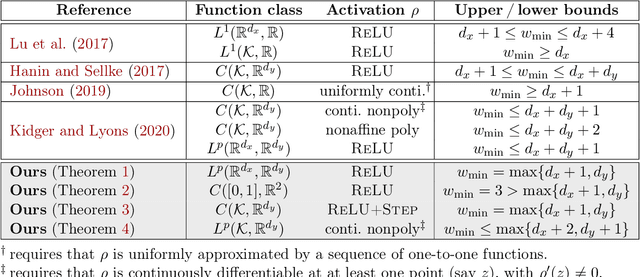



Abstract:The universal approximation property of width-bounded networks has been studied as a dual of classical universal approximation results on depth-bounded networks. However, the critical width enabling the universal approximation has not been exactly characterized in terms of the input dimension $d_x$ and the output dimension $d_y$. In this work, we provide the first definitive result in this direction for networks using the ReLU activation functions: The minimum width required for the universal approximation of the $L^p$ functions is exactly $\max\{d_x+1,d_y\}$. We also prove that the same conclusion does not hold for the uniform approximation with ReLU, but does hold with an additional threshold activation function. Our proof technique can be also used to derive a tighter upper bound on the minimum width required for the universal approximation using networks with general activation functions.
Learning Bounds for Risk-sensitive Learning
Jun 15, 2020
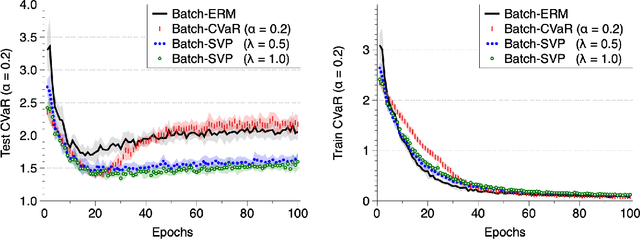
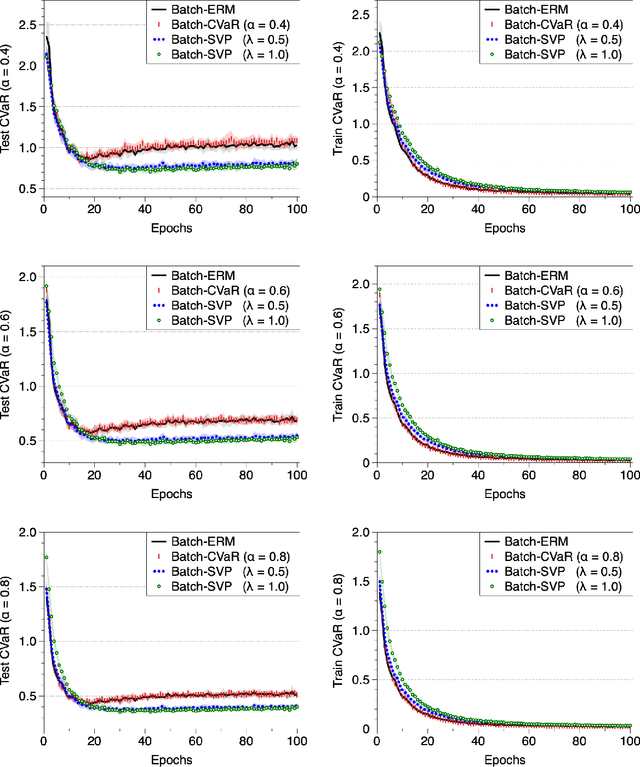
Abstract:In risk-sensitive learning, one aims to find a hypothesis that minimizes a risk-averse (or risk-seeking) measure of loss, instead of the standard expected loss. In this paper, we propose to study the generalization properties of risk-sensitive learning schemes whose optimand is described via optimized certainty equivalents (OCE): our general scheme can handle various known risks, e.g., the entropic risk, mean-variance, and conditional value-at-risk, as special cases. We provide two learning bounds on the performance of empirical OCE minimizer. The first result gives an OCE guarantee based on the Rademacher average of the hypothesis space, which generalizes and improves existing results on the expected loss and the conditional value-at-risk. The second result, based on a novel variance-based characterization of OCE, gives an expected loss guarantee with a suppressed dependence on the smoothness of the selected OCE. Finally, we demonstrate the practical implications of the proposed bounds via exploratory experiments on neural networks.
 Add to Chrome
Add to Chrome Add to Firefox
Add to Firefox Add to Edge
Add to Edge